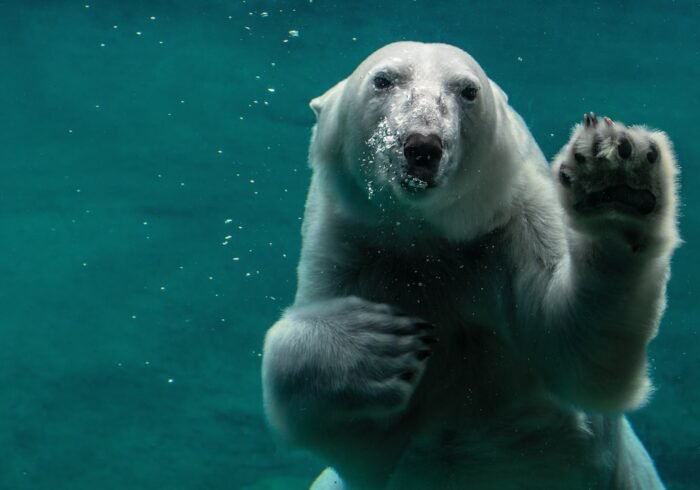A Comprehensive Overview of Whale Shark Conservation The largest fish in the ocean, whale sharks (scientifically known as *Rhincodon typus*) can grow to a length of 40 feet or more. Plankton, tiny fish, and other microscopic organisms are the main foods consumed by these gentle giants, who are filter feeders. Whale sharks are found in warm, tropical waters all over the world. They are frequently sighted close to the surface, where they can be seen swimming elegantly. Divers and marine enthusiasts love them for their easy recognition and unique pattern of white spots and stripes on a dark blue-gray background.
Key Takeaways
- Whale sharks are the largest fish in the world and are known for their gentle nature and filter-feeding behavior.
- Threats to whale sharks include bycatch in fishing gear, boat strikes, and habitat degradation due to coastal development and pollution.
- Current conservation efforts for whale sharks include protected areas, research and monitoring programs, and public awareness campaigns.
- International collaboration is crucial for the conservation of whale sharks, as they migrate across multiple countries’ waters and are subject to global threats.
- Research and data collection on whale sharks are essential for understanding their behavior, population dynamics, and migration patterns.
Whale sharks are known for being placid despite their size. Often referred to as “gentle giants,” they are not dangerous to people. Their sluggish movements and propensity to gather in specific locations during feeding periods have made them a well-liked ecotourism destination. But the many dangers they encounter in the wild eclipse their intriguing biology and behavior, leading to urgent calls for conservation measures to save these amazing animals.
An Important Risk Is Overfishing. Overfishing, both intentional & accidental, is one of the biggest threats to whale sharks. Because their meat, fins, and oil are regarded as delicacies or utilized in traditional medicine, whale sharks are hunted in some areas.
Their numbers have decreased as a result of this unsustainable practice, especially in places with lax or poorly enforced fishing laws. There is a serious risk of habitat degradation. For whale sharks, habitat degradation is a major concern. Climate change, pollution, & coastal development have all exacerbated the degradation of their natural habitats.
| Conservation Effort | Location | Impact |
|---|---|---|
| Marine Protected Areas | Various coastal regions | Preserves critical habitats |
| Research and Monitoring | Global | Provides data for conservation strategies |
| Community Engagement | Coastal communities | Raises awareness and promotes sustainable practices |
| Regulatory Measures | International waters | Controls fishing and shipping activities |
Many marine species depend on coral reefs as their home, but human activity is destroying them at alarming rates. effects of habitat loss. Whale sharks face an increasing threat to their survival as their food sources diminish along with these habitats. Numerous conservation initiatives have been launched globally in response to the concerning decline in whale shark populations.
Marine conservation organizations have started campaigns to increase public awareness of these animals’ predicament. The significance of preserving whale sharks & their habitats is emphasized in educational initiatives aimed at both tourists & local communities. The goal of conservationists is to lessen destructive behaviors and advance sustainable tourism by encouraging a sense of stewardship among people who engage with these animals. Also, a number of nations have put in place safeguards for whale sharks.
For example, fishing is restricted or outright forbidden in marine protected areas (MPAs) established by certain countries. For whale sharks and other marine life, these MPAs provide a safe haven where populations can recover & flourish. Also, cross-border cooperation is required to safeguard migratory species like whale sharks, as acknowledged by international accords like the Convention on Migratory Species (CMS). Whale shark conservation necessitates an international cooperative effort. Addressing the issues that cut across national borders requires international cooperation.
Diverse governments and organizations have joined forces to exchange best practices, resources, and knowledge regarding whale shark conservation. Comprehensive strategies that include research, policymaking, and community engagement have been developed as a result of this cooperative approach. The Whale Shark Research Project is a prominent illustration of international cooperation, as it unites scientists from various nations to investigate whale shark populations and their migration patterns. Researchers can better understand the behaviors and habitats of these animals by combining data and resources, which will ultimately help shape conservation strategies.
These collaborations not only advance scientific understanding but also cultivate a sense of global accountability for the preservation of these amazing animals. Whale shark conservation is greatly aided by research. Creating successful conservation plans requires an understanding of their biology, behavior, and migration patterns. To collect data on whale shark populations, scientists use a variety of techniques, such as satellite technology for tracking and tagging individual sharks.
This makes it possible for scientists to track their movements and pinpoint important habitats that require preservation. Scientists monitor the genetic diversity of whale shark populations in addition to their movements. Genetic research can reveal information about regional connectivity and population structure.
For evaluating population health and choosing the best management strategies, this data is essential. Scientists can modify conservation tactics to address new threats and guarantee the long-term survival of whale sharks by consistently gathering & evaluating data. A key component of effective whale shark conservation initiatives is community involvement.
Being the ones who interact with these animals the most, local communities frequently play a crucial role in their protection. Involving local communities in conservation efforts promotes a feeling of accountability & ownership for nearby marine environments. One successful strategy has been the creation of monitoring programs rooted in the community. Data on whale shark sightings and behaviors is gathered by trained local fishermen & residents as part of these programs. This gives communities more power and gives researchers studying these animals useful information.
Involving local communities in ecotourism projects can also generate financial rewards for conservation. Communities are more inclined to support conservation efforts when they can clearly see the advantages of preserving whale sharks. Legislation and effective policy are essential elements of whale shark conservation. Regulations created by governments are essential in preventing overfishing & habitat destruction for these animals.
Laws that forbid hunting whale sharks or control fishing methods in regions where they are known to congregate have been passed in a number of nations. On a larger scale, international agreements also aid in whale shark conservation. Whale sharks are listed under Appendix II of the Convention on International Trade in Endangered Species (CITES), which governs the international trade in species that, if left unchecked, could become threatened. These legal frameworks encourage nations to cooperate in the conservation of whale sharks and offer crucial protections for these animals.
Significant obstacles still face whale sharks’ future despite continuous conservation efforts. The availability of food and the conditions of these animals’ habitats are two aspects of marine ecosystems that are threatened by climate change. Ocean acidification poses a threat to coral reefs that offer vital habitats, while rising ocean temperatures have the potential to disturb plankton blooms, which are whale sharks’ main food source. These difficulties do, however, also offer chances for creative conservation tactics. Technological developments can improve data collection on whale shark populations & monitoring operations.
Also, heightened public knowledge of climate change could result in more people supporting environmental laws meant to lessen its effects. In conclusion, coordinated efforts at the local, national, and international levels offer hope for whale shark survival, even though their future is still uncertain due to numerous threats. It may be possible to preserve these amazing animals as well as the wellbeing of marine ecosystems for future generations by encouraging cooperation between scientists, decision-makers, communities, & conservation groups. The fight to protect whale sharks is not yet complete, but with commitment and collaboration, there is hope for a better future for these gentle giants of the ocean.



